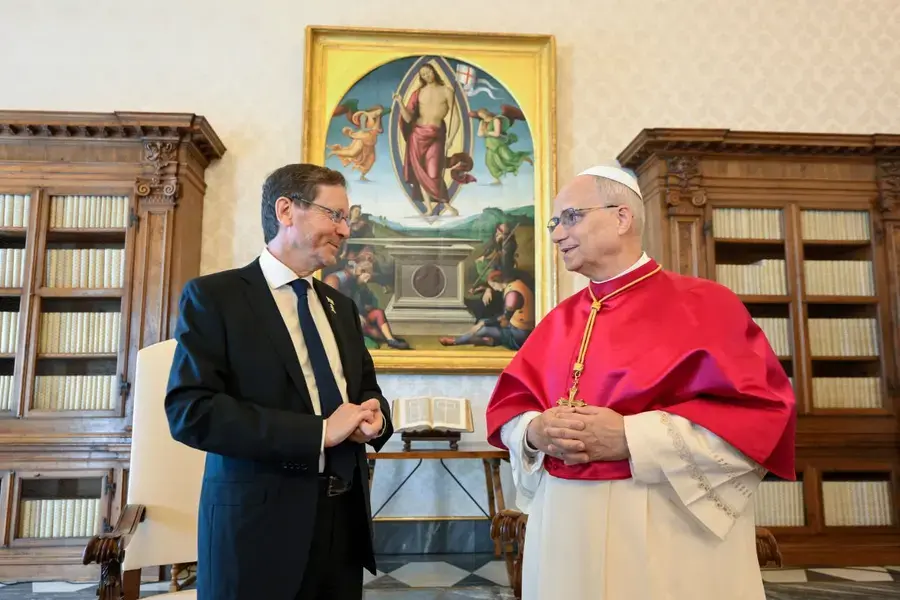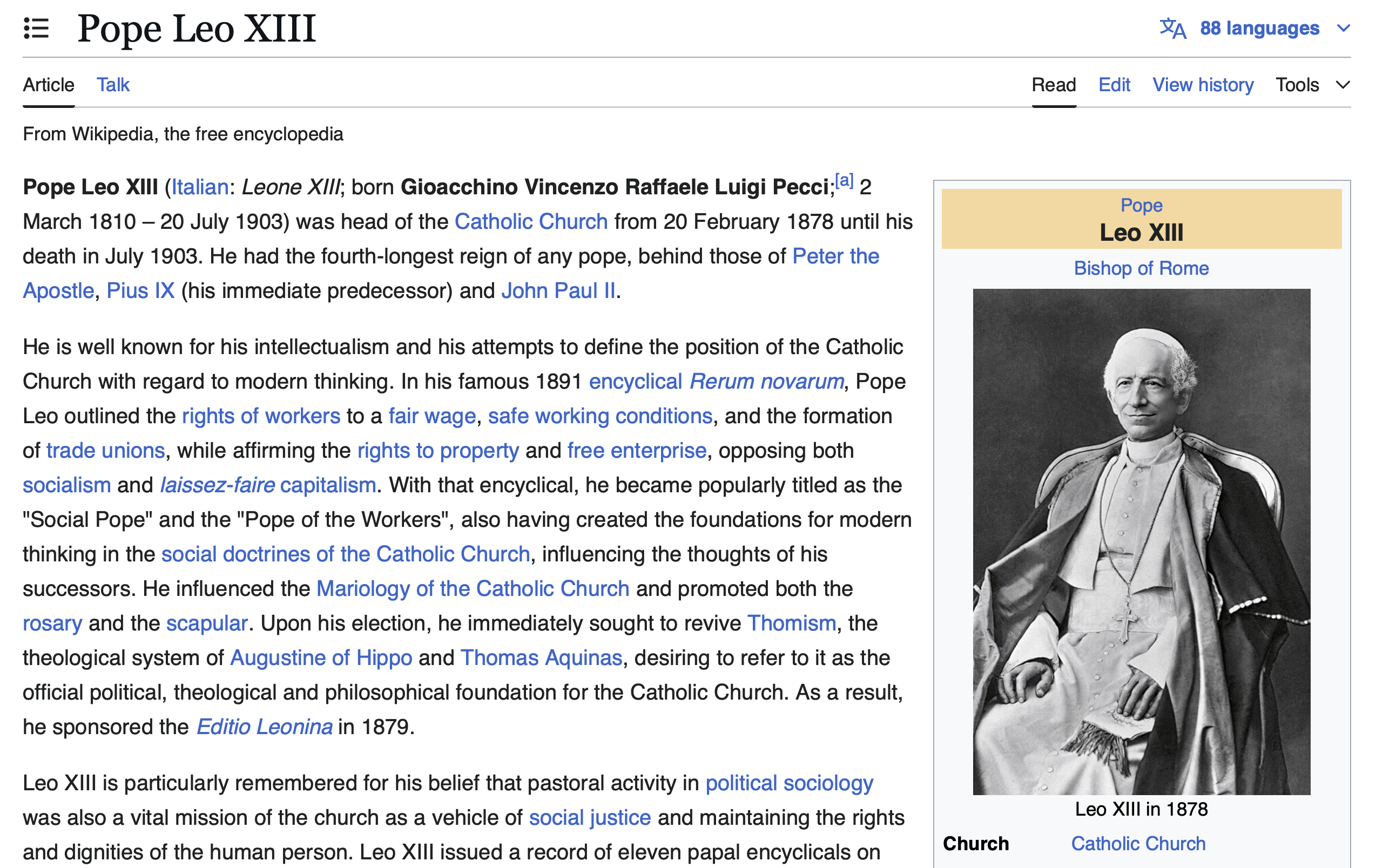Pope tells priests to use their brains, not AI, to write homilies
WTF?
#SteveBannon courted #Epstein in his efforts to ‘take down’ #PopeFrancis
Steve Bannon, a former White House adviser to #Trump, discussed opposition strategies with convicted sex offender #JeffreyEpstein against #Pope Francis, with Bannon saying he hoped to “take down” the pontiff, according to newly released files from the #DOJ.
#EpsteinFiles #law #criminal #rape #ChildSexCrimes #pedohilia #SexTrafficking #felon47 #RapistInChief #CoverUp
https://www.cnn.com/2026/02/14/world/bannon-epstein-take-down-pope-francis-latam-intl?cid=ios_app
WTF?
#SteveBannon courted #Epstein in his efforts to ‘take down’ #PopeFrancis
Steve Bannon, a former White House adviser to #Trump, discussed opposition strategies with convicted sex offender #JeffreyEpstein against #Pope Francis, with Bannon saying he hoped to “take down” the pontiff, according to newly released files from the #DOJ.
#EpsteinFiles #law #criminal #rape #ChildSexCrimes #pedohilia #SexTrafficking #felon47 #RapistInChief #CoverUp
https://www.cnn.com/2026/02/14/world/bannon-epstein-take-down-pope-francis-latam-intl?cid=ios_app
The Holy No See
Pope: Vatican not ready to make Gaza genocide declaration, but suffering impossible to ignore
Pope Leo XIV says in a July interview that was published today that the Holy See is not yet prepared to make an official declaration that a genocide is under way in Gaza, even as more international experts apply the term.
“Officially, the Holy See does not believe that we can make any declaration at this time about that,” the pontiff told US journalist Elise Ann Allen.
"'The election of an American Pope, the first American Pope … there’s a signal here that the church is taking a side in what’s happening around the globe,' said Steven Millies, a professor at Catholic Theological Union. …
'We are watching authoritarianism swell in all parts of the globe, but is fueled most visibly by the Trump administration in Washington, D.C.,' Millies said."
~ Jack Jenkins
“The election of an American pope, the first American pope … there’s a signal here that the church is taking a side in what’s happening around the globe.”
"But the strategy collapsed. Cardinals ultimately united around Robert Prevost, now Pope Leo XIV, who helped push Francis’ historic reform adding women to the Vatican’s bishop-nomination process."
"'The election of an American Pope, the first American Pope … there’s a signal here that the church is taking a side in what’s happening around the globe,' said Steven Millies, a professor at Catholic Theological Union. …
'We are watching authoritarianism swell in all parts of the globe, but is fueled most visibly by the Trump administration in Washington, D.C.,' Millies said."
~ Jack Jenkins
"This wasn’t their first attempt: back in 2018, Napa’s founder Tim Busch helped fund the 'Red Hat Report,' using former FBI and CIA agents to dig up dirt on progressive cardinals seen as potential successors to Francis, particularly regarding abuse cases.
This year, similar smear tactics surfaced, with Trump’s former Vatican ambassador Brian Burch reportedly backing a false health rumor about Cardinal Pietro Parolin, a leading contender."
"But the strategy collapsed. Cardinals ultimately united around Robert Prevost, now Pope Leo XIV, who helped push Francis’ historic reform adding women to the Vatican’s bishop-nomination process."
As Rogue DNC reports,
"During 'America Week,' wealthy Catholic donors hosted VIP events in Rome, with promises of $1 billion in donations if the 'right pope' was elected. Groups like the Napa Institute, a MAGA-aligned network, led the charge."
"This wasn’t their first attempt: back in 2018, Napa’s founder Tim Busch helped fund the 'Red Hat Report,' using former FBI and CIA agents to dig up dirt on progressive cardinals seen as potential successors to Francis, particularly regarding abuse cases.
This year, similar smear tactics surfaced, with Trump’s former Vatican ambassador Brian Burch reportedly backing a false health rumor about Cardinal Pietro Parolin, a leading contender."
"[The cardinals] were intensely lobbied by MAGA with $100 bottles of wine and promises of massive donations.
But after just two days of voting, the Catholic Church’s College of Cardinals spurned pressure to install a Trump-friendly pope. Instead they voted for one in the mold of Pope Francis—and an American at that, who has already been a public critic of Donald Trump."
~ Janna Brancolini
#LeoXIV #pope #Trump #Vance #RobertPrevost
/9
https://www.thedailybeast.com/cardinals-humiliate-maga-with-social-justice-warrior-pope-leo-xiv/
As Rogue DNC reports,
"During 'America Week,' wealthy Catholic donors hosted VIP events in Rome, with promises of $1 billion in donations if the 'right pope' was elected. Groups like the Napa Institute, a MAGA-aligned network, led the charge."
"[The cardinals] were intensely lobbied by MAGA with $100 bottles of wine and promises of massive donations.
But after just two days of voting, the Catholic Church’s College of Cardinals spurned pressure to install a Trump-friendly pope. Instead they voted for one in the mold of Pope Francis—and an American at that, who has already been a public critic of Donald Trump."
~ Janna Brancolini
#LeoXIV #pope #Trump #Vance #RobertPrevost
/9
https://www.thedailybeast.com/cardinals-humiliate-maga-with-social-justice-warrior-pope-leo-xiv/
"Catholic cardinals on Thursday elected a new pope—and it's not Donald Trump."
~ Emily Singer
#LeoXIV #pope #Trump #Vance #RobertPrevost
/8
https://www.dailykos.com/stories/2025/5/8/2321234/-Trump-loses-another-election
"And maybe—just maybe—this reality was obvious the College of Cardinals, too.
Maybe they looked at America and realized that it was no longer a colossus bestriding the globe. No longer exceptional. Not just in decline, but deluded about its reality.
Maybe Robert Prevost was elected pope because the Church realized they no longer needed to be concerned about America power."
"But we are [in decline] and it’s obvious.
It’s obvious to the people of Canada, who just elected a prime minister exclusively on the grounds that the American century was over.
It’s obvious to the Chinese, who are planning to step into the vacuum and establish their own world order.
It’s obvious to our European allies, who are now making plans for a future in which America is toothless, lazy, and impotent."
Jonathan V. Last cautions against thinking the papal election is all about things American. But he notes that right before Robert Prevost was made pope, American big-wig MAGA priest Robert Barron said, "until America goes into political decline, there won’t be an American pope."
"Barron is one of America’s MAGA priests, so naturally he could not imagine that anyone else in the world might view America as being in decline."
#LeoXIV #pope #Trump #Vance #RobertPrevost
/5
https://www.thebulwark.com/p/seven-things-to-know-about-the-american-pope-leo-xiv
Wajahat Ali agrees:
"What you're witnessing is a response, right? You're seeing the global community say, 'We've seen how America has completely destroyed itself and we want a different path. So they could have chosen a conservative pope to ingratiate themselves with J.D. Vance and Donald Trump. And they went the other way, Francesca."
Thought I'd find out what the last Pope Leo did, to see if it gave an indication of the new Pope Leo. Interesting!
#Pope
#NewPopeWhoDis


![Pope Leo XIV in St Peter’s Square at the Vatican [File: Remo Casilli/Reuters]](https://files.mastodon.social/media_attachments/files/115/225/179/632/175/029/original/56d56c6df354376a.webp)
